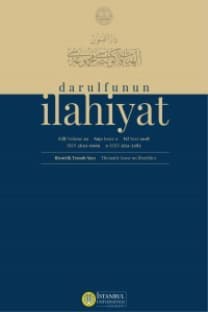Mülk Suresinde Estetik: Metafizik Ayna Olarak Matematiksel Tipoloji
Kur’an’ın 67. Suresi olan Mülk Suresi yedi cenneti keskin hatlı görüntülerle resmetmektedir. Bu kozmografik görüntü
‘Kur’ani edebi tasvir’ diye formule edilen bazı metinsel simgelerin bir tanesidir. Nitekim 24. Sure olan Nur Suresi’nde
geçen ve bir oyukta yer alan kandildeki ilahi nur; 27. Sure olan Neml suresindeki Süleyman’ın sarayındaki cam zemin
gibi bu simgelere pek çok örnek verilebilir. Bu makale cennet tasvirleriyle Mülk Suresi’nin dini hitabette çok önemli bir
estetik anlam taşıdığını iddia etmektedir. Ayrıca bu çalışma, bir dilbilimci olan Muhammed Hüseyin Kazi tarafından yapılan
surelerin sözcük seçimi ile ilgili bir değerlendirmeyi de kapsamaktadır.
Anahtar Kelimeler:
Mülk Suresi, İslam Tefsiri, İslam Estetiği, İslam Filolojisi Kur’ani Edebi Tasvir
Aesthetics in Surat al-Mulk: Mathematical Typology as Metaphysical Mirror
Qur’an 67, Surat al-Mulk (‘Surat of the Kingdom’), describes the seven heavens in a sharply contoured image. This
cosmographic image is one of the few textual icons forming the ‘Quranic literary iconography’. The divine light contained
in a lamp within a niche in Surat al-Nur (‘Surat of the Light’, 24), or the glass sarh of Solomon’s palace, in Surat al-Naml
(‘Surat of the Ants’, 27), constitute other examples among these icons. This essay argues that, by means of the heavenly
description, Surat al-Mulk conveys an aesthetic meaning that is pivotal to its religious rhetoric. As a complement, this
study includes an examination of the surat’s phraseology by the linguist Muhammad Husain Kazi.
Keywords:
Surat al-Mulk, Islamic exegesis, Islamic aesthetics, Islamic philology Qur’anic literay iconography,
___
- Abdel Haleem, Muhammad. Understanding the Qurʾan: Themes and Styles. London and New York: I. B. Tauris, 2001. Altieri, Charles. The Particulars of Rapture: An Aesthetics of the Affects. Ithaca: Cornell University Press, 2003. Bernet, Rudolf. “Phenomenological Reduction and the Double Life of the Subject”, In Reading Heidegger from the Start: Essays in His Earliest Thought, edited by Theodore Kisiel and John van Buren, 245-268. Albany: SUNY Press, 1994. Bernet, Rudolf, Kern, Iso, and Marbach, E duard. An Introduction to Husserlian Phenomenology. Evanston: Northwestern University Press, 1993. Boisliveau, Anne-Sylvie. Le Coran par lui-même. Vocabulaire et argumentation du discours coranique autoréférentiel. Leiden: Brill, 2014. Borges, Jorje Luis. Labyrinths, Selected Stories and Other Writings. London: Penguins Classics, 2000. Boullata, Issa J., ed. Literary Structures of Religious Meaning in the Qurʾan. London and New York: Routledge, 2009. Bourriaud, Nicolas. Relational Aesthetics. Dijon: Les Presses du Réel, 1998. Crowther, Paul. Phenomenology of the Visual Arts. Stanford: Stanford University Press, 2011. Cuypers, Michel. “Structures rhétoriques des sourates 92 à 98.” Annales Islamologiques 34 (2000): 95–138. Drutt, Matthew. Malevitch, Kazimir: Suprematism. New York: Guggenheim Museum Publications, 2003. Finger, Anke, and Follett, Danielle, ed. The Aesthetics of the Total Artwork: On Borders and Fragments. Baltimore: The Johns Hopkins University Press, 2011. Gonzalez, Valerie. Beauty and Islam, Aesthetics of Islamic Art and Architecture. London, New York: IBTauris, 2001. Gonzalez, Valerie. Le piège de Salomon, la pensée de l’art dans le Coran. Paris: Albin Michel, 2002. Gonzalez, Valerie. “The Comares Hall in the Alhambra and James Turrell’s Space that Sees: A comparison of Aesthetic Phenomenology.” Muqarnas 20 (2003): 253-78. Gonzalez, Valerie. “The Hermeneutics of Islamic Ornament: The Example of the Alhambra.” In Studying the Near and Middle East at the Institute for Advanced Study, Princeton 1935-2018, edited by Sabine Schmidtke, 375-388. Piscataway: Gorgias Press. Gwynne, Rosalind W. Logic, Rhetoric and Legal Reasoning in the Qurʾan. London and New York: Routledge, Curzon, 2004. Ha’iri Yazdi, Mehdi. Universal Science: An Introduction to Islamic Metaphysics. Leiden: Brill, 2017. Jones, Tamsin. “New Materialism and the Study of Religion.” In Religious Experience and New Materialism: Movement Matters, edited by Joerg Rieger and Edward Waggoner. Springer International Publishing, 2017, 1-23. https://link.springer.com. Kazemi, Reza-Shah. “Divine Beatitude: Supreme Archetype of Aesthetic Experience.” In Seeing God Everywhere: Essays on Nature and the Sacred, edited by Barry McDonald, 215-226. Bloomington: World Wisdom, 2003. Lu, Peter and Steinhardt, Paul J. “Decagonal and Quasicrystalline Tilings in Medieval Islamic Architecture.” Science 315 (February 2007): 1106-10. DOI: 10.1126/science.1135491. http:// www.sciencemag.org/content/315/5815/1106. Madigan, Daniel A. The Qur’ân’s Self-image: Writing and Authority in Islam’s Scripture. Princeton: Princeton University Press, 2001. “Minimalism.” In Concepts of Modern Art, From Fauvism to Postmodernism, edited by Nikos Stangos. London, New York: Thames and Hudson, 2001, 244. Mulla, Sadra. Metaphysical Penetrations: A Parallel English-Arabic Text. Translated by Seyyed, Hossein Nasr. Chicago: The University of Chicago Press, 2014. Pary, Joseph, ed. Art and Phenomenology. London, New York: Routledge, 2010. Puerta Vílchez, José Miguel. Aesthetics in Arabic Thought from Pre- Islamic Arabia through AlAndalus. Leiden: Brill, 2017. Qur’an. translated by Ahmed ‘Ali. Princeton: Princeton University Press 1989. Sirakovitch, Tanya, ed. Victory over the Sun, Russian Avant-Garde and Beyond. The Israel Museum, Jerusalem. Catalogue of the exhibition Winter 2018-Spring 2019.
- Yayın Aralığı: Yılda 2 Sayı
- Başlangıç: 1925
- Yayıncı: İstanbul Üniversitesi İlahiyat Fakültesi
Sayıdaki Diğer Makaleler
Dil-Kur’ân-Anlam Üzerine Tefsire Metodolojik Bir Katkı -Ebüssenâ el-İsfahânî’nin Mukaddimesi
Osmanlı’da İlm-i Tefsir: Âlimler, Eserler ve Meseleler 14-15 Aralık 2018
Evlenme ve Boşanma Deneyimleri Arasındaki İlişkide Dindarlık Faktörünün İncelenmesi
Mülk Suresinde Estetik: Metafizik Ayna Olarak Matematiksel Tipoloji
Şia Hadis Tarihi Adlı Eser Üzerine
ABD’de Hıristiyan Siyonizmi: Kökeni, İnanç Esasları ve Günümüz Amerikan Siyasetine Etkisi
Dil-Kur’ân-Anlam Üzerine Tefsire Metodolojik Bir Katkı -Ebüssenâ el-İsfahânî’nin Mukaddimesi-
